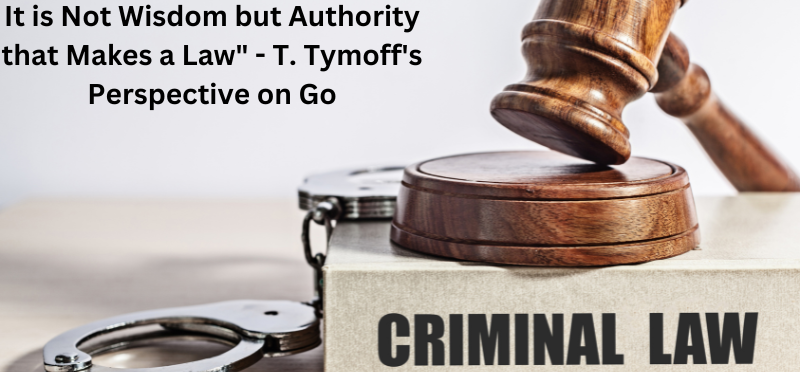It is Not Wisdom but Authority that Makes a Law” – Exploring T. Tymoff’s Perspective on Legal Governance
Introduction:
In the intricate web of legal philosophy, T. Tymoff’s Perspective “It is Not Wisdom but Authority that Makes a Law” presents a thought-provoking perspective on the nature of legal governance. Attributed to T. Tymoff, this phrase challenges conventional notions that laws should primarily arise from wisdom or moral principles. Instead, it suggests that authority, perhaps wielded by those in power, is the primary force shaping the legal landscape. This article delves into T. Tymoff’s perspective, examining the implications of prioritizing authority over wisdom in the context of legal systems.

The Primacy of It is Not Wisdom but Authority:
T. Tymoff’s assertion underscores the role of authority in the creation and enforcement of laws. From a historical standpoint, many legal systems have indeed been shaped more by the authority of rulers and lawmakers than by a profound understanding of justice or ethical principles. The authority to create laws often rests with government bodies, legislative bodies, or individuals in positions of power. This raises questions about the legitimacy of laws crafted solely based on authority without a foundation in wisdom or ethical reasoning.
must read= Wisdom but Authority
Read also- mary lou nguyen si kha • overcome emotions • 2022
Legal Realism and Social Context: T. Tymoff’s Perspective
Legal realism, a school of thought in jurisprudence, aligns with T. Tymoff’s perspective by emphasizing the importance of considering social context and the actual effects of laws rather than relying solely on abstract legal principles. If authority is the driving force behind laws, legal realists argue, the social, economic, and political context in which laws are enacted becomes crucial. This perspective challenges the traditional belief that laws are created and applied based on a rational and wise understanding of justice, suggesting that authority may play a more significant role in shaping legal norms.

The Risks of Unchecked Authority: T. Tymoff’s Perspective
While authority is an essential component of legal governance, the potential risks associated with unchecked authority cannot be ignored. T. Tymoff’s assertion raises concerns about the abuse of power and the imposition of laws that may not be just or wise. If authority is the sole determinant of legal principles, there is a risk of authoritarianism and the erosion of fundamental rights. This prompts a critical examination of the balance between authority and wisdom in the formulation of laws to ensure a just and equitable legal system.
Wisdom in Legal Governance:
It is Not Wisdom but Authority T. Tymoff’s perspective highlights the influence of authority on legal systems, it is essential to recognize the value of wisdom in legal governance. Wisdom encompasses a deeper understanding of ethical principles, justice, and the long-term consequences of legal decisions. Wisdom can be derived from diverse sources, including moral philosophy, historical precedents, and societal values. Integrating wisdom into legal systems can contribute to the creation of laws that are not only authoritative but also just and reflective of societal values.

The Intersection of Authority and Wisdom:
In a nuanced exploration of legal governance, it is crucial to recognize that authority and wisdom are not mutually exclusive. The most effective legal systems often strike a balance between the two, acknowledging the need for authority to establish and enforce laws while drawing on wisdom to ensure the just and equitable application of those laws. The interplay between authority and wisdom creates a dynamic legal framework that adapts to evolving societal norms and values.
Conclusion:
T. Tymoff’s perspective, encapsulated in the phrase “It is Not Wisdom but Authority that Makes a Law,” prompts a critical examination of the forces that shape legal governance. While authority undoubtedly plays a central role in the creation and enforcement of laws, the integration of wisdom is crucial for ensuring justice, fairness, and the protection of individual rights.
A thoughtful and balanced approach to legal governance recognizes the inherent tension between authority and wisdom, striving to create a legal system that reflects both the power of those in positions of influence and the ethical foundations that underpin a just society.




